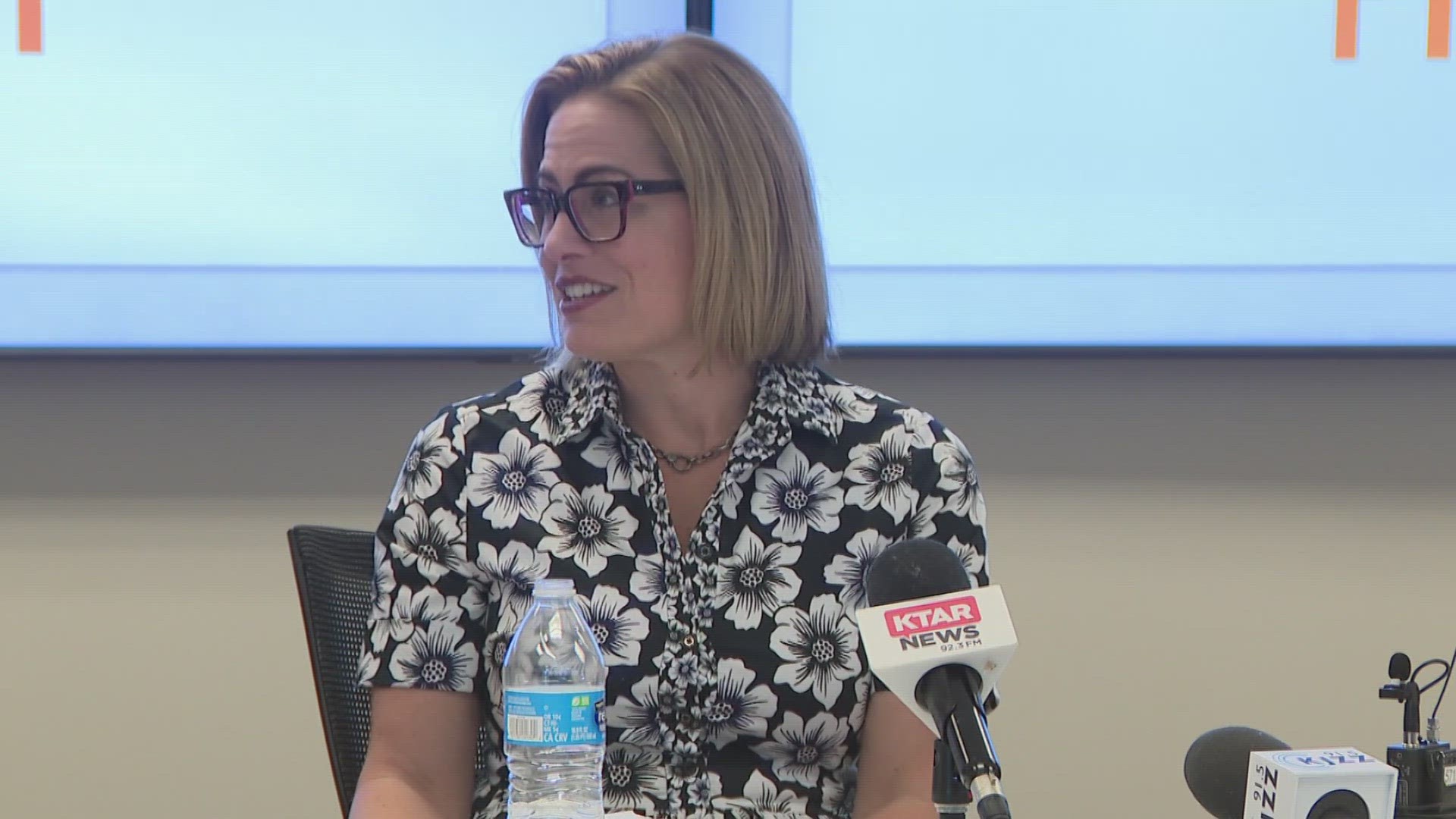MESA, Ariz. — A fentanyl roundtable discussion hosted by Sen. Kyrsten Sinema (I) Monday featured experts from law enforcement, healthcare and the rehab industry. Sinema largely agreed with their recommendations that Congress pass more legislation to destigmatize drug addiction and fund more long-term, robust rehab services.
“We know that preventing the spread of drugs into our communities is just part of the solution,” Sinema told the group. “We also have to improve access to treatment, recruit more qualified health professionals and peer counselors.”
Fentanyl “woven into every aspect” of drug addiction
Ed Pinnow, Residential Treatment Center Director of Terros Health, estimated 90% of patients being treated have fentanyl in their system. The powerful, cheap drug is laced into other drugs like marijuana, often without the user knowing it.
“It’s woven its way into every aspect of this disease of addiction,” Pinnow said.
He told Sinema relapses are rampant among fentanyl users and the average patient in his program has overdosed six times.
Withdrawals are often so painful, patients leave treatment within the first three days.
“If we could get them help with medically assisted treatment quicker, we can treat them longer,” Pinnow said.
Mesa Officer: “We need a global shift in perception”
Det. Aaron Raine with Mesa police deviated from the typical script one might hear a law enforcement officer use when describing people addicted to drugs. He didn’t talk about the criminal aspect of the problem, but the medical.
“It’s tragic and sad,” Raine said. “Until we start looking at this like diabetes, right? I’m pre-diabetic,” Raine said.
“Aren’t we all,” Sinema quipped.
Raine continued.
“But the reality is, is it’s not viewed the same, right? Until we can change that public perception, all of these good people in this room who want to help people, it’s hard. We need a global shift in perception,” Raine said.
He said Mesa is looking at alternative ways to treat the problem. He used the example of a judge transferring a suspect into a rehab facility.
“Utilizing this as a transfer as opposed to the old system of just locking them in a cage,” Raine said.
One participant asked Sinema about removing a restriction to the HUD Housing application system that currently denies applicants who use methadone. Affordable housing is crucial to recovery, the participant said.
Sinema expressed interest in the proposal and asked the participant to contact her staff about the issue.
Another participant advocated for supervised drug consumption centers where people take controlled doses they know aren’t tainted. In these environments, drug users are more likely to seek help from counselors who are available to build a rapport with them, he said.
“There’s a lack of trust with healthcare professionals at the moment because of the push for abstinence-based recovery,” said Julien Witowski of Sonoran Prevention Works.
Witowski’s proposal is supported by Jenni Nye, Chief Operating Oficer of Terros Health. Witowski said people who are going to use drugs anyway would have a safer environment where they could access help.
“The concept of safe-use sites is something that would be really powerful for our country to look at implementing,” Witowski said.
Sinema and others promoting new laws, awareness
Sinema is working to reauthorize the Support Patients and Communities law, a bill Sinema co-sponsored in 2018 that supports substance abuse programs. She is also co-sponsoring to other bills aimed at fentanyl prevention and law enforcement. One bill, the Fend Off Fentanyl Act, targets the profits cartels make through drug trafficking.
“We’ve got to stop the flow of these drugs over the border into Arizona,” Sinema said, noting a DEA report showing 85% of fentanyl discovered in the U.S. originated from the border of Arizona and Mexico.
Asked about a bill that would authorize physicians and pharmacies to dispense Methadone, Sinema said she is working to grow bipartisan support.
“The question about passing legislation is really a question we have with every piece of legislation in Congress which is, how do you get it through the dysfunctional machine that is Congress,” Sinema said. “Our goal is to try to attach that legislation to another vehicle that is moving.”
Rep. Ruben Gallego also recently proposed a bill to target financial institutions used to launder money in the fentanyl trade.
Up to Speed
Catch up on the latest news and stories on the 12News YouTube channel. Subscribe today.

